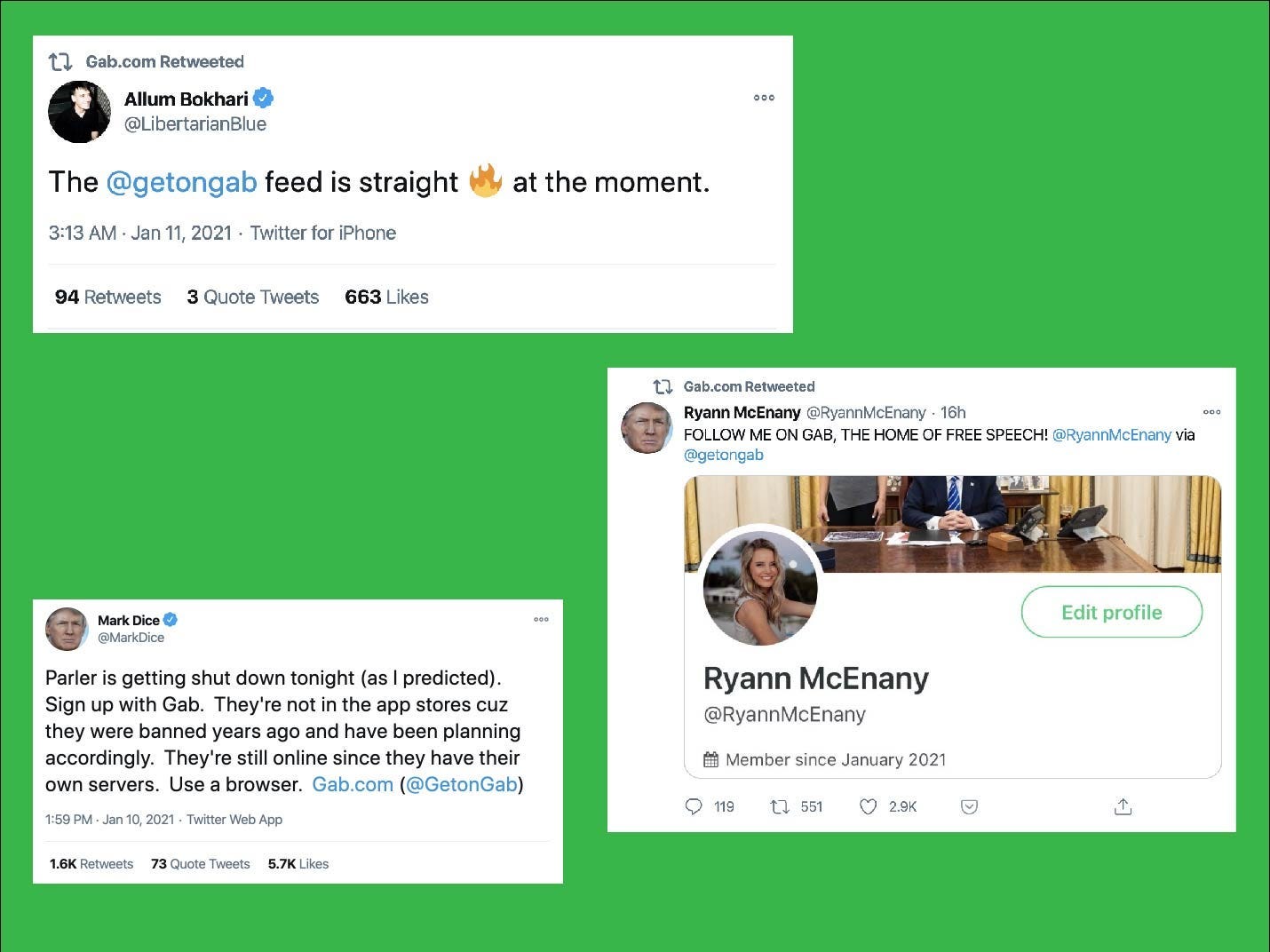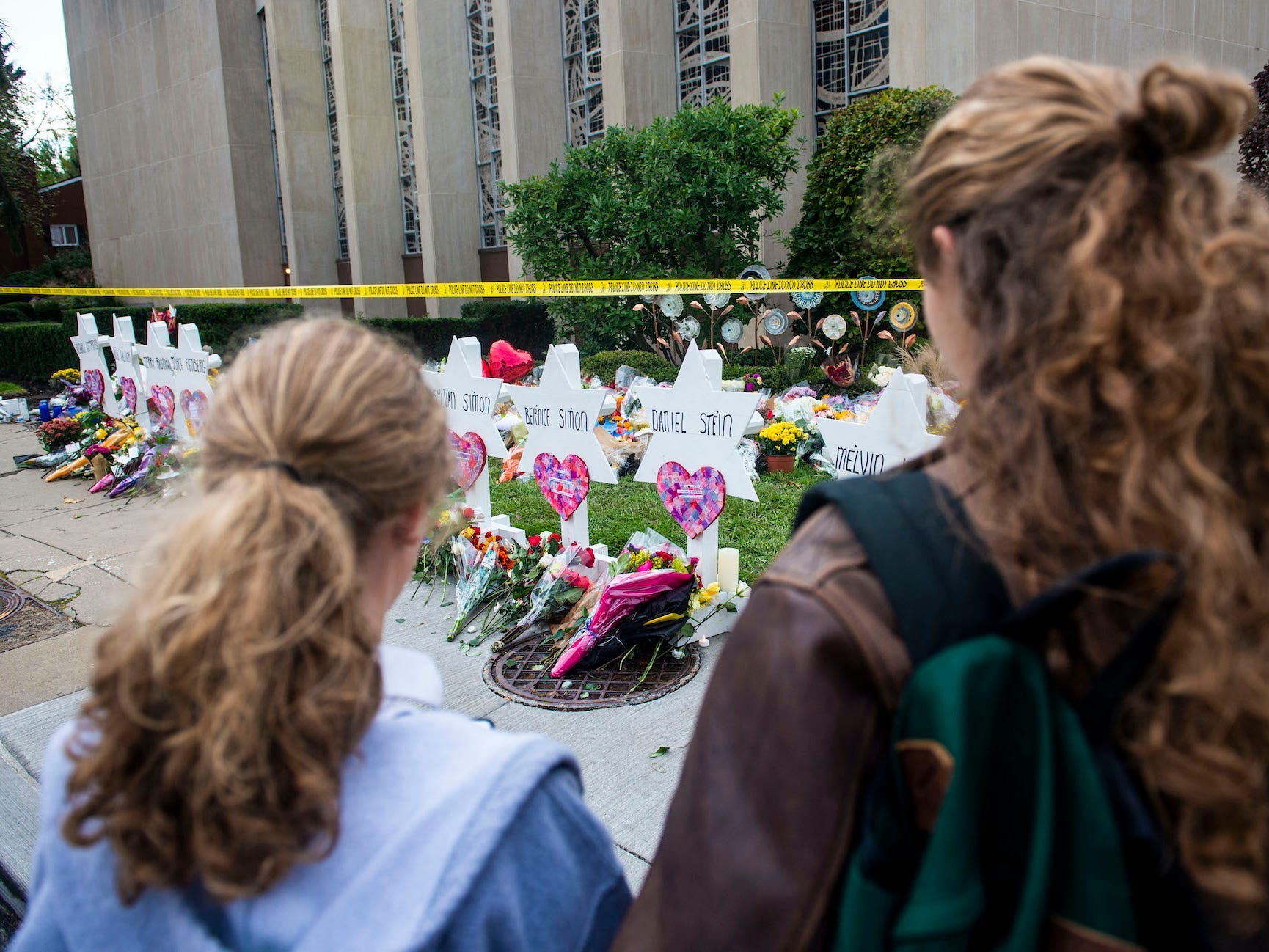
- Gab is a social media platform that has become a hot spot for far-right figures like Infowars founder Alex Jones as well as white supremacist and anti-Semitic rhetoric since it launched in 2016.
- That’s because it doesn’t moderate content as Twitter does — Gab markets itself as a vehicle for free speech and doesn’t crack down on posts that would be considered hateful or containing false information.
- Since launching in 2016, Gab has been suspended by Stripe, PayPal, Amazon’s cloud-hosting service, Google’s cloud platform, Apple’s app store, and its former domain registrar GoDaddy over hate speech violations.
- And in 2018, the shooter of the Tree of Life Pittsburgh synagogue attack took to Gab to voice anti-Semitic rhetoric before killing 11 people.
- Now, after Facebook and Twitter banned President Trump from their platforms following the US Capitol siege, many on the right are flocking to sites like Gab — the company said it’s seeing 10,000 new users every hour, but Apple and Google have long banned it from their app stores.
- Visit Business Insider’s homepage for more stories.
As mainstream social sites deplatform President Trump and other far-right users for spreading misinformation and inciting violence, smaller fringe networks appear to be absorbing the runoff.
Gab is one of them – it was founded in 2016 as an alternative social platform to Facebook and Twitter. Its founder sought to build a place where users can embrace free speech and post without moderation at a time when mainstream sites began to crack down on misinformation, efforts that coincided with Trump’s rise to the presidency.
After pro-Trump extremists violently stormed the US Capitol last week, the discourse reignited around how social media services can radicalize and provide platforms to those seeking to carry out violence. The rioters were found to have organized for weeks ahead of time on Twitter, Facebook, Parler, and TheDonald.
Since then, Facebook has blocked Trump’s access to the site and Twitter has permanently suspended the president, and smaller sites like Parler have been banned by Google and Apple’s app stores, as well as dropped from Amazon’s AWS service, over its failure to moderate threats of violence.
Apple kicked Gab off in 2016 over hate speech violations, as have Google and Amazon and yet, the platform has risen in popularity since it launched as one of a handful of online ecosystems that attracted those on the fringes.
It's gaining 10,000 new users every hour, the company reported over the weekend.
Here's how Gab became a favorite among the alt-right.
Gab was bred out of a desire to escape Twitter's moderation policies on false information and hate speech
Cofounder and CEO Andrew Torba told Buzzfeed News in late 2017 he had become fed up with how major social media websites censor people's posts. "What makes the entirely left-leaning Big Social monopoly qualified to tell us what is 'news' and what is 'trending' and to define what 'harassment' means?" Torba said.
Gab looks a lot like both Twitter and Reddit, as the New York Times reported, and posts - called "gabs" - are capped at 300 characters.
The site quickly became a cesspool of white supremacists, anti-Semites, and other users who were booted off of mainstream tech platforms, like Milo Yiannopoulos, Alex Jones, and white nationalist leader Richard B. Spencer. The website purports to be committed to anyone who shares "in the common ideals of Western values, individual liberty, and the free exchange and flow of information," but far-right ideologies are what largely populates the small community. It had around 1 million registered users in April 2020, according to Fox Business.

Jon Cherry/Getty Images
Torba posted a gab early Monday showing an illustration of President Trump with an eagle resting on his shoulders standing alongside a lion. Far-right Irish YouTuber Dave Cullen, who has run the channel Computing Forever, posted a farewell video on Monday after YouTube banned him for violating its policies. He said this won't affect how he operates.
Cullen's Gab bio reads "If they won't let you say it, that means it MUST be said. #AllSpeechMatters."
Like other far-right alternatives, such as Parler, Gab markets itself as being committed to free speech. Gab's online rules prohibit some types of posts, like threats of violence and illegal pornography. But other than that, it uses little moderation and doesn't restrict posts that might be widely considered to be misleading or to qualify as hate speech. It does give users an option to mute posts that they find offensive.
The shooter in a 2018 attack on the Pittsburgh Tree of Life synagogue took to the platform to post a series of anti-Semitic messages before killing 11 people. The website went offline for a short while following the shooting, which has been called the deadliest attack on the Jewish community in American history.
The shooter falsely alleged that a Jewish refugee organization "likes to bring invaders in that kill our people," according to an archive of his posts on Gab. "I can't sit by and watch my people get slaughtered. Screw your optics, I'm going in."

Matthew Hatcher/SOPA Images/LightRocket via Getty Images
Gab has been banned by big tech companies regularly since it launched in 2016
Big tech companies have restricted Gab in the past, just as Google, Amazon, and Apple have taken action on Parler after pro-Trump rioters stormed the US Capitol.
In 2016, Apple blocked the Gab app over pornographic content and hate speech, and Google banned it from its Google Play store as well. Gab filed a lawsuit against Google over the block before dropping it.
In 2017, the site's online domain registrar threatened to kick Gab off for violating hate speech laws with more racist and anti-Semitic posts. A company spokesperson said it removed the posts' author but that it was "looking for a domain registrar provider that supports lawful, politically incorrect free speech."
In August 2018, Microsoft threatened to boot Gab off of its Azure cloud computing service over anti-Semitic posts calling for "vengeance" against Jews and for the vandalism of Holocaust memorial museums. The Gab user who wrote the posts later deleted them.
After the 2018 Pittsburgh shooter was found to have posted anti-Semitic posts on Gab, PayPal announced it was banning the platform from using it as a payment option. Stripe followed suit shortly after, as did Medium, Shopify, and GoDaddy, Gab's domain registrar. Gab soon found a new domain registrar with the company Epik.
And in 2019, Amazon announced it would stop allowing Gab to raise money via its Amazon Web Services platform because the site "promotes content that constitutes hate speech." It attempted to solicit up to $10 million from investors beforehand.
The far-right can spread more lies on Gab because the site doesn't heavily moderate content - and it's rapidly gaining new users
These sites commonly tout themselves as upholding free speech and say the likes of Twitter are infringing on the First Amendment by cracking down on misinformation. But as Business Insider's Tyler Sonnemaker reported, it is within both Twitter and Gab's rights to moderate their platforms as they see fit since they are private companies. The First Amendment prevents the government from censoring private citizens and firms, not the other way around.
As mainstream sites like Twitter and Facebook ramp up their implementation of moderation policies, which has resulted in the permanent suspension of President Trump, experts told Insider in a previous interview that Parler and Gab could rise in popularity, where users will be able to more easily spout conspiracy theories and false information.
Indeed, we're seeing that happen already - Gab said on Twitter Saturday that the platform is gaining 10,000 new users every hour.
"Gab gained more users in the past 2 days than we did in our first two years of existing," the company tweeted Sunday.
And Parler shot up to the No. 1 spot on Apple's App Store after Facebook and Twitter de-platformed Trump.
However, Parler is now offline after Amazon broke ties with the service, and Parler CEO John Matze said the platform could stay down for up to a week. Parler has filed a lawsuit against Amazon over antitrust violations, alleging that the e-commerce giant's ban was politically motivated and was anti-competitive since it didn't take similar action against Twitter.
Troy Wolverton contributed to an earlier version of this report.

